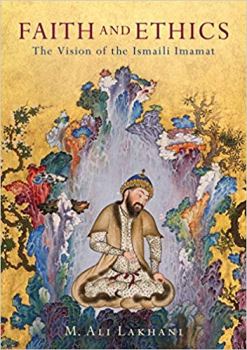Recently, Andrew Frisardi (American writer, translator, and independent Dante scholar) posted his detailed review of M. Ali Lakhani’s book Faith and Ethics: The vision of the Ismaili Imamat on Amazon. Following is the shortened version of the review. Click here for full review.
Faith and Ethics addresses an urgent present reality: the challenges brought about by globalization, modernization, and cultural fragmentation, whereby groups of people  from widely diverse backgrounds and worldviews must reach deep for tolerance and understanding. The book consists of an extensive and detailed account of the ethical teachings of Prince Shah Karim al-Husseini (born in Geneva in 1936), the fourth Aga Khan, who is the hereditary spiritual leader or Imam of Shi’i Ismaili Muslims. The author, M. Ali Lakhani, QC, a Canadian barrister and the founder-editor of Sacred Web: A Journal of Tradition and Modernity, is himself an Ismaili Muslim. Lakhani draws on the Aga Khan’s own lectures and writings, to make the latter’s thought accessible and often conversational in tone.
from widely diverse backgrounds and worldviews must reach deep for tolerance and understanding. The book consists of an extensive and detailed account of the ethical teachings of Prince Shah Karim al-Husseini (born in Geneva in 1936), the fourth Aga Khan, who is the hereditary spiritual leader or Imam of Shi’i Ismaili Muslims. The author, M. Ali Lakhani, QC, a Canadian barrister and the founder-editor of Sacred Web: A Journal of Tradition and Modernity, is himself an Ismaili Muslim. Lakhani draws on the Aga Khan’s own lectures and writings, to make the latter’s thought accessible and often conversational in tone.
Four of the book’s ten chapters explain how the Imam’s ethical teachings are applied in a real-world, contemporary context; for example, through his initiative the Aga Khan Development Network, a network of NGOs and developmental agencies which work primarily in the poorest parts of Africa and Asia, addressing developmental, humanitarian, and cultural needs, without regard to differences of religious affiliation, ethnicity, or gender. The other chapters offer an explanation of the Ismaili community and of the Imam and his role among Ismaili Muslims; of the Quranic and Islamic-theological basis of the Aga Khan’s teachings; and of the challenges of modernity that his teachings address. As someone coming from a Catholic background, I was struck by how much the Aga Khan’s ethical vision resembles that of Pope Francis: both religious leaders view globalization as a call to the pluralistic tolerance at the heart of their respective faiths, not as a pretext for xenophobia and retrograde policies meant to stop inexorable change.
Andrew Frisardi is a Fellow of and frequent lecturer at Temenos Academy, in London, which offers adult education in philosophy and the arts in the light of the sacred traditions of East and West. He also frequently contributes poems, essays, translations, and reviews to the Academy’s journal, Temenos Academy Review.
Can we have this book
LikeLike